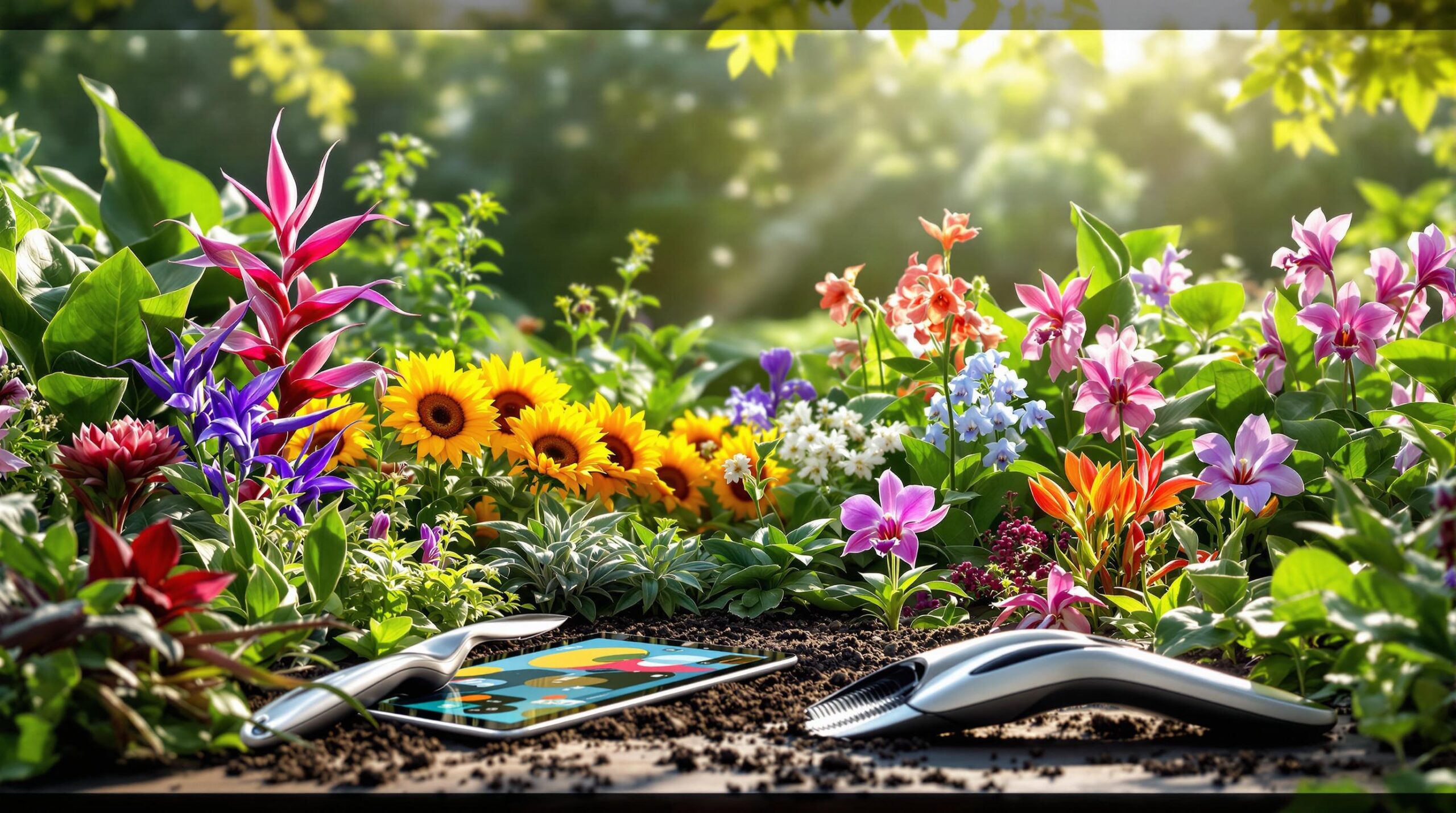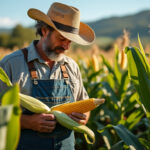In a world where technology seamlessly intersects with our daily lives, the journey of gardening has been revolutionized through the advent of AI-powered applications. Among these advancements, Flora Incognita stands out as an exceptional tool that not only helps users identify over 30,000 plant species but also enriches our understanding of biodiversity. This innovative app is transforming garden design and plant care, empowering both amateur and seasoned gardeners to foster a deeper connection with nature. Through its unique blend of citizen science and botanical intelligence, Flora Incognita supports environmental initiatives while offering a cost-free and ad-free experience. As we delve into its transformative capabilities, we will explore how this tool complements modern gardening practices and enhances our environmental stewardship.
- Flora Incognita: A Revolution in Plant Identification
- The Role of GardenAI in Sustainable Practices
- Connecting with Nature: The Citizen Science Movement
- Future of Garden Design: EcoFlora and SmartGarden Innovations
Flora Incognita: A Revolution in Plant Identification
At the intersection of botanical expertise and cutting-edge technology, Flora Incognita is redefining how we engage with the natural world. Imagine being able to identify a multitude of plant species at your fingertips! This exceptional application harnesses the power of GardenAI, allowing users to effortlessly recognize an astonishing array of flora—from common garden plants to exotic species found in the wild.
One of the most impressive aspects of Flora Incognita is its comprehensive plant profiles, which provide detailed information about each species. Users can explore characteristics such as growth patterns, habitat requirements, and conservation status. 🌱 With over 30,000 species cataloged, this powerful tool is not just about identification; it’s about fostering a deeper understanding of our ecological communities.
Empowering Users Through Technology
In recent years, applications like FloraTech have made botanical identification more accessible than ever. Yet, Flora Incognita goes beyond mere identification. It invites users to engage with their environment actively, sparking curiosity and a sense of responsibility towards the conservation of plant biodiversity. This approach is perfectly aligned with the ecological needs of 2025, as concerns over biodiversity loss continue to escalate.
The app also operates effectively offline, catering to individuals in educational institutions and environmental organizations that may not have consistent internet access. This accessibility ensures that learners and environmental advocates can utilize the app as a vital resource for research, education, and awareness-building. Whether you are a seasoned gardener or a curious beginner, this app offers a unique avenue for growing your botanical knowledge. 🌍
| Feature | Description | Benefit |
|---|---|---|
| Species Database | Over 30,000 plant species | Extensive knowledge base for users |
| Offline Mode | Access data without internet | Ideal for educational use |
| Ad-Free Experience | No hidden costs | Focus on learning without distractions |
| Civic Engagement | Contribute data to scientific research | Empower users to make a difference |
The Role of AI in Gardening
The integration of botanical intelligence through apps such as Flora Incognita signifies a pivotal moment in gardening. As we approach 2025, the marriage of traditional gardening practices with advanced technologies like AI is essential for creating sustainable landscapes. This fusion of knowledge enables gardeners to make informed decisions, optimizing plant selection and care methods tailored to their specific environments.
Imagine working on a landscape project where you can select plants based on their water requirements, growth habits, and regional adaptation—all at the touch of a button. 🌿 The ability to utilize data-driven insights results from the backing of GardenGenius innovations, which put plant lovers in the driver’s seat of their gardening journeys.
The Role of GardenAI in Sustainable Practices
As the environmental landscape shifts, sustainable gardening practices have gained momentum. The application of GardenAI in this arena is transformational—allowing gardeners to adopt eco-friendly methods while maximizing yield. Through tailored recommendations for plant care and landscape design, tools like Flora Incognita and EcoGrow initiatives aim to make sustainability not only an ideal but also a practical reality.
Maximizing Resources Through Intelligence
By employing AI technologies, gardeners can make smarter decisions about resource allocation. For instance, adaptive recommendations on watering schedules based on weather patterns contribute to water conservation efforts. An informed gardener is an empowered gardener, lessening the environmental impact and promoting responsible gardening. 🌊
Data-driven insights incorporated within apps like EcoFlora guide users in selecting drought-resistant plants or assessing soil health, creating flourishing environments with minimal environmental footprint. These practices are a testament to the future of gardening; we must adapt to a rapidly changing climate while preserving our natural ecosystems.
| Sustainability Practice | Usage of GardenAI | Potential Impact |
|---|---|---|
| Water Conservation | Smart irrigation scheduling | Reduced water waste |
| Soil Restoration | Soil health assessment | Healthy plant growth |
| Drought Resistance | Selection of native plants | Lower maintenance costs |
| Waste Reduction | Composting recommendations | Lower landfill contributions |
Embracing Smart Garden Innovations
The future of gardening in 2025 is brimming with innovation, and this is where the concept of the SmartGarden emerges front and center. By integrating advanced technologies—such as AI—into the gardening experience, we can facilitate a holistic approach towards creating flourishing landscapes that harmonize with nature.
SmartGardens exemplify the blend of technology and natural elements. Picture an automated irrigation system, coordinated with local weather forecasts, to maintain optimal soil moisture levels. 🌼 Such systems enable gardeners to spend less time on manual maintenance and gain more opportunities to appreciate the beauty around them.
Connecting with Nature: The Citizen Science Movement
As we awaken to the urgency of preserving our planets, the role of citizen science in gardening cannot be overstated. The integration of community-driven initiatives with the functionalities offered by Flora Incognita magnifies the collective impact on our environment. 🌍
Building a Community of Knowledge
Citizen science encourages individuals to actively participate in ecological research, even with minimal experience. By utilizing apps that enable plant identification, users can contribute their observations to larger databases, helping scientists track plant populations and biodiversity shifts. This process is vital for understanding the health of ecosystems and the effects of climate change.
Through engaging platforms, such as EcoGrow, individuals can cultivate their gardening knowledge while playing a pivotal role in ecological interventions. 🌸 Active participation fosters a sense of stewardship as communities unite to protect their local environments. When we work together, the possibilities for impactful change are immeasurable.
| Community Action | Citizen Science Contribution | Environmental Outcome |
|---|---|---|
| Local Plant Surveys | Document species diversity | Enhanced local biodiversity |
| Wildflower Restoration | Promote native plant growth | Support pollinator populations |
| Soil Health Workshops | Educate on organic practices | Improved soil quality |
| Community Gardens | Shared knowledge and resources | Stronger community bonds |
The Ripple Effect of Citizen Engagement
By embracing citizen science, ordinary individuals become extraordinary agents of change. Each observation recorded, every plant identified through Flora Incognita contributes to a broader narrative that informs environmental policies and conservation efforts. The engagement of citizens in this process serves to highlight the interconnectedness we share with our surroundings.
As technology empowers us to connect with nature, it also fosters compassion for the planet. Our gardens become sanctuaries where we cultivate not only plants but also a sense of purpose and belonging. 🌿 Together, we can forge a legacy of stewardship that protects future generations of plant enthusiasts.
PlantSnap: Identifying Plants to Elevate Your Garden Design
Future of Garden Design: EcoFlora and SmartGarden Innovations
The landscape of 2025 will continue to evolve, driven by innovative design principles rooted in sustainability. The emergence of the PlantPalette concept encapsulates the essence of creating living, breathing spaces that reflect the surrounding ecosystem. By leveraging the capabilities of SmartGarden technology, designers will craft landscapes that adapt naturally with their environment, fostering biodiversity and beauty.
Implementing Sustainable Garden Designs
As landscape designers embrace EcoFlora principles, the focus shifts towards harmonizing flora with environmental conditions. Understanding the regional context and selecting plants that thrive in particular locales optimizes the resilience of gardens. This timeless approach resonates deeply with the aspirations of gardeners in 2025, as they seek to cultivate landscapes that are not only visually pleasing but also ecologically significant.
Utilizing technology to inform these decisions creates a more sustainable future. Equipped with data-driven insights, designers can create landscapes that require fewer resources while promoting local biodiversity. 🌼 Such innovations highlight a commitment to environmental stewardship and showcase the collaborative partnership between technology and nature.
| Design Element | EcoFlora Principle | Environmental Benefit |
|---|---|---|
| Plant Selection | Native and drought-resistant species | Less water consumption |
| Soil Management | Organic amendments and cover crops | Enhanced soil health |
| Composting | Reduce waste and enrich soil | Decrease landfill contributions |
| Wildlife Support | Pollinator-friendly plants | Strengthen local ecosystems |
Envisioning Gardens of Tomorrow
As we look to the future of garden design, the principles of innovation and ecological responsibility will guide the way. The evolution of FusionFlora techniques will enable designers to adapt to climate challenges while embracing creative and functional elements. The gardens of tomorrow will serve not only as places of beauty but also as essential components of our planet’s health. 🌳
By integrating cutting-edge technologies and sustainable practices, we can envision rich, biodiverse landscapes that reflect our commitment to coexist with nature. As gardeners and stewards of the land, our mission is to cultivate a profound appreciation for the environment while fostering resilience in our garden ecosystems.
FAQs
What is Flora Incognita?
Flora Incognita is an AI-powered app that allows users to identify over 30,000 plant species, providing detailed information on each plant’s characteristics, conservation status, and more.
How can I use Flora Incognita for gardening?
You can use Flora Incognita to identify plants in your garden, learn about their care requirements, and contribute to citizen science efforts through collecting data on plant biodiversity.
What role does AI play in sustainable gardening?
AI in gardening helps optimize plant selection, irrigation schedules, and soil health assessments, enabling gardeners to make informed decisions that promote sustainability.
What is the significance of citizen science in plant care?
Citizen science allows everyday individuals to contribute to research efforts, document plant populations, and enhance our understanding of biodiversity, fostering a collective responsibility towards environmental protection.
How do SmartGardens work?
SmartGardens utilize technology to automate garden care processes, such as irrigation and soil monitoring, which help maintain optimal plant health while minimizing resource use.















